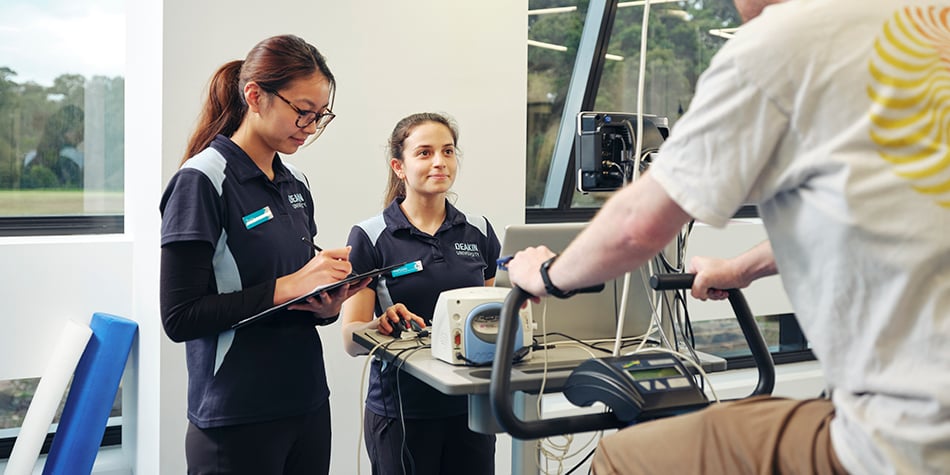Each year, incredible graduates pass through our Master of Clinical Exercise Physiology (MCEP), many of whom go on to become mentors and employers for the next generation of students. In part two of our two-part series, meet two more MCEP alumni who are using research to make a difference.
The evidence base for exercise physiology is constantly growing and changing. Many of the people contributing to this evolution are graduates of our Master of Clinical Exercise Physiology – including Jacqueline Pengelly and Matt Clarkson.
Dr Jacqueline Pengelly: Cardiac rehabilitation
Dr Jacqueline Pengelly completed her Bachelor of Exercise and Sports Science and MCEP at Deakin. She’s an accredited exercise physiologist, accredited exercise scientist and ESSA member and a lecturer in clinical exercise physiology at Federation University.
As a researcher, Jacqueline’s main focus is cardiac rehabilitation. She completed her PhD on exercise for postoperative heart surgery patients in mid-2022. The project showed that heart surgery patients, usually restricted to light activity for up to 12 weeks, could safely commence resistance training as soon as two weeks post-surgery.
'We’re now looking at updating the Australian guidelines to encourage people to be more active sooner,' she says.
For Jacqueline, research is a gateway to giving real people real outcomes to improve their lives.
'I love looking at things that haven't been done before and then trying to figure out how they’re going to change things clinically… and that it's actually feasible for people to implement rather than requiring equipment that's worth thousands of dollars.
'I’ve now taken on part of our program student supervision. That’s something I'm really proud of because it means I can branch out into other research that’s not necessarily cardiac.'
Dr Matt Clarkson: Blood flow restriction exercise
Dr Matt Clarkson was part of the first cohort to graduate from the Master of Clinical Exercise Physiology at Deakin. He also completed his undergraduate degree, honours, and PhD at Deakin – 11 years in total. He’s now using that experience to set other students up for the future as course chair for Victoria University’s (VU) Master of Clinical Exercise Science and Rehabilitation.
Matt’s PhD focused on using blood flow restriction – likened to using blood pressure cuffs around exercising limbs – to enhance the impacts of aerobic exercise for people with chronic kidney disease undergoing dialysis.
'It's essentially a way to trick the body into thinking it's doing harder work than it actually is,' says Matt.
The project followed three groups of people doing dialysis – one that did no exercise, one that did exercise without blood flow restriction, and one that did exercise with blood flow restriction. While both exercise groups improved on all physical function and strength measures, the group with blood flow restriction improved strength by a greater amount.
'There’s not yet enough evidence to support mass adoption of blood flow restriction exercise in clinical populations, but there have been subsequent studies internationally that have also looked at the technique with a different array of measures as a result,' says Matt.
Matt’s role at VU encompasses a mix of teaching and research. He says his time at Deakin played a fundamental role in shaping the professional he is today.
'I couldn’t have asked for more, really. Deakin had very high-end facilities right from the time when I was looking at doing my undergraduate there. That just improved over time.'
The staff were real content experts within the different fields attached to each of the units. That became even more apparent in the masters because it was the first masters tailored to exercise physiology that pulled academics from the different specialties in the area and brought them together in one course to provide a very holistic approach to what an exercise physiologist needed to know. That shone through right from the start.
Dr Matt Clarkson
Course Chair, Master of Clinical Exercise Science and Rehabilitation at Victoria University
Matt’s current role at Victoria University is one he’s proud to hold.
'Outside of my personal life, this is the thing that I value the most. Around the country, there's only 20 or 30 of these roles and only five or six in Victoria. To be one of them is very meaningful for me. It allows me to see what's happening in the industry from all the different perspectives… to be able to tie in and translate that to students gives me a lot of satisfaction.'
Since graduating, Matt’s been impressed to see the breadth and impact of the roles many of his peers from the MCEP have ended up in.
'It’s a credit to the course.'
Ready to make a difference as an accredited exercise physiologist? Explore the Master of Clinical Exercise Physiology.

